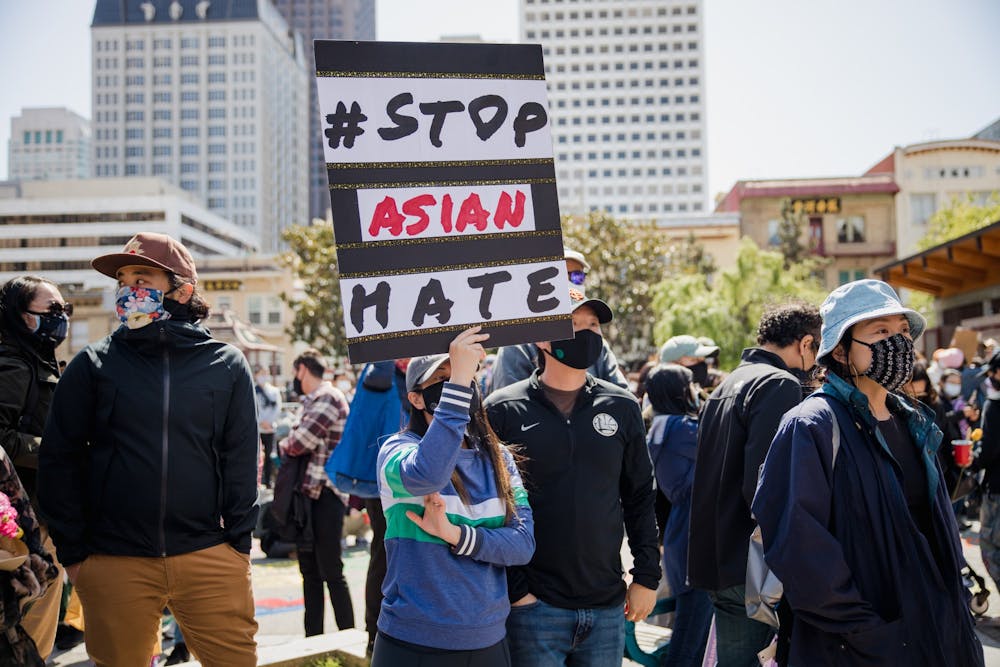Discrimination against Asian Americans is once again on the rise.
That was the message behind Monday’s virtual event, Violence Against Asian Americans and the Portrait of Asian Americans in the Law, hosted by the American Constitution Society at the University of Illinois and co-sponsored by the UB School of Law’s ACS chapter.
The hourlong event which was co-hosted by ACS programs at a half-dozen schools, highlighted a drastic rise in anti-Asian crimes, fueled by the pandemic.
Speakers shared their personal encounters with anti-Asian hate speech and proposed remedies for the underrepresentation of Asian Americans in senior executive positions and the legal professions. The need for representation, they argued, is far more urgent now than ever before as violence poses an increasing threat to the AAPI community. On March 16, eight people, including six Asian American women, were shot and killed in three Atlanta salons. The shooting followed a months-long rise in the frequency of AAPI-targeted assaults.
In 2020, there were 3,800 anti-Asian hate crimes, according to Stop AAPI Hate, a reporting forum founded last year. An analysis by the Center for the Study of Hate and Extremism found those crimes represented a 149% increase in anti-Asian hate crimes across 16 of America’s largest cities from 2019-20 — an uptick that does not account for unreported events which likely comprise the majority of racially-motivated hate crimes, panelists said.
Associate Justice of the California Supreme Court Goodwin H. Liu was among the event’s invited speakers. He highlighted a lack of unified voices in Asian American activism as well as a perceived complacency toward racist attitudes in American society.“We just don’t have a collective voice nationally… where priorities get discussed… this has got to change,” Liu said.
An event organizer asked Liu what he believed was behind the uptick in violent anti-Asian crimes. Liu attributed the rise to negative “stereotypes of Asian Americans.”
Liu also explained that members of the AAPI community are particularly vulnerable to becoming victims of crimes due to their “perceived submissiveness.”
Liu recalled an anecdote from his childhood that reminded him of how much he had internalized racist steryotypes.
“I had a good friend who used to call me [slurs—t],” Liu said. “I just didn’t think to object... I didn’t really have a language to say something. Every single Asian American I know has experienced something like this in their lives.”
Liu also emphasized the “universality” and “internalized complacency” of racism in America.
“I thought it was normal for people to treat you badly,” Liu said. “[You feel like] you’re a guest in someone else’s country.”
His parents, he recalled, would always advise him to “just move on.” They taught him to “always choose stability over change.”
Liu also highlighted the lack of Asian Americans working in the field of law and holding executive positions. Ninety five percent of the U.S.’ over 2,400 prosecutors are white. Only eight are Asian Americans, according to Liu.
Liu not only highlighted the lack of Asian American representation across various facets of American society, but proposed solutions as to how organizations and institutions can combat a lack of racial diversity within their ranks.
“One, organizations need to have greater intentionality about combating implicit stereotypes of Asian Americans,” Liu said. “They aren’t portrayed as leaders, but as worker bees. That’s got to change. Second… we have to think about the soft skills. Public speaking, how to develop a network — we have to think about how to develop those. Once you get to the midpoint of your career, these soft skills will be more necessary than the basic competent skills.”
Vikram D. Amar, dean of the University of Illinois School of Law, also spoke on institutional racism against Asians.
Amar responded to an inquiry from an event organizer who spoke of a negative bias toward Asian Americans in schools’ use of affirmative action admissions.
“I think that anti-asian discrimination is actually a seperate issue from affirmative action,” Amar said. “I think these two issues have been yoked together. There is a bit of racial mascotting going on with respect to Asian Americans.”
Liu concluded the event by expressing his hopes for the future, particularly his hope that the conversation around AAPI discrimination will continue long after the current news cycle fades from public memory.
“I’m worried that in about two to three weeks the news cycle is going to move on,” Liu said. “It’s important to keep this at the forefront.”
The news desk can be reached at news@ubspectrum.com





